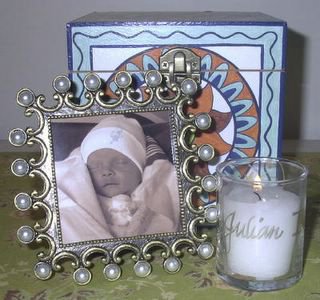I am only 5 1/2 weeks pregnant and already, I have been making a mental list of "What not to say to a subsequently-pregnant-after-a-loss mom." People can be really clueless. In no particular order, here are my new guidelines for how to behave around a SPALS mom such as myself:
1. Don't keep asking a woman who has suffered through pregnancy or infant loss if she is "pregnant yet." Planning a subsequent pregnancy is not exactly a joyous experience (especially when it doesn't happen quickly), and constant inquiries only add to the stress and isolation she feels on a daily basis.
2. If and when she does inform you of her subsequent pregnancy, be happy for her, but not overly celebratory. If she lost a full-term baby, she is bound to feel very vulnerable and anxious during her subsequent pregnancy, and knows too well that a positive pregnancy test doesn't automatically guarantee a successful pregnancy or a live healthy baby at the end of 9 months. She needs your care and support, but not a cheerleader. If you're unsure about the appropriate tone, follow her lead.
3. Don't perceive her new pregnancy as a sign that she has "moved on" or is "over" the baby she lost. She will never be over it, and will probably struggle a great deal with how to celebrate her pregnancy and bond with the new baby, while continuing to grieve for the baby who died.
4. Similarly, if you haven't done such a good job of listening to, supporting, visiting, or staying in touch with her since her baby died, don't take the announcement of the new pregnancy as a signal for you to try to resume your friendship where you left off before she lost her baby, as though you are relieved that she is "normal" and back to her "old self" again. Not only is this a false perception, but she may resent this kind of fair-weather friendship and may even be reluctant to tell you about her pregnancy for fear that you will respond in such a way.
5. Don't assume that she no longer wants to talk about the baby who died. Most SPALS moms love it when you remember their babies, especially (but not only) on anniversaries and holidays.
6. Don't assume that she now wants to hear about other peoples' pregnancies or other peoples' babies. Despite the fact that she is herself pregnant, she may feel very removed from those who have had an easy time of getting pregnant and bringing home a baby. Try to continue to be as sensitive and mindful about what you say to her (and within earshot of her) as you hopefully would have been during the months immediately following the death of her baby.
7. Please do try to keep your feelings about God, religion, etc. to yourself in relation to her pregnancy and/or the baby she lost (i.e., references to "God's will," "God's plan," "angels," or her "faith"). It is
possible to offer secular or non-religious responses that sound more sincere and authentic than those that may be meaningless to her, depending upon her beliefs. Otherwise, there is a risk that your truly supportive sentiments may be clouded by religious imagery that she may be offended by if she is an agnostic, atheist, or has a
nontheistic worldview.










